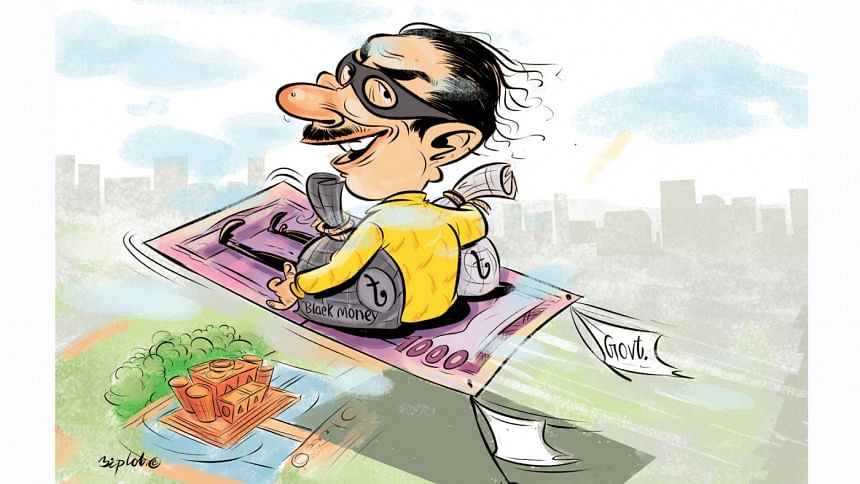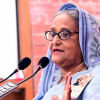Whitening Black Money: ‘Unethical, unjust and unacceptable’

Backtracking on its promise to eliminate black money, the government has once again made room to allow both individuals and companies to whiten money without facing scrutiny and by paying a 15 percent tax, a move that drew sharp criticism from economists and civil society.
The government hopes the initiative will increase the flow of money into the economy despite such measures failing to yield any fruitful benefits in the past.
According to the new provision, no authority can raise any question if a taxpayer pays tax at fixed rates for immovable properties such as flats and land and 15 percent tax on other assets, including cash, irrespective of the existing laws of the country.
The scope to whiten black money will remain in place till June 2025.
Before the last national election, the Awami League's election manifesto promised strong measures against those hoarding undisclosed money as well as those engaged in corruption.
But economists and corruption watchdogs said that successive governments allowing the whitening of black money was akin to "licencing corruption".
"This scope shouldn't be allowed at all," said Prof Mustafizur Rahman, a distinguished fellow at the Centre for Policy Dialogue, a think tank. "It's unacceptable, ethically and financially."
When countries such as India and Indonesia provided the scope to whiten black money, they only did so for a certain period and with the warning attached that they would penalise anyone who failed to whiten money within the deadline.
"Bangladesh, however, continues to provide amnesty year after year. As a result, the objective remains unachieved," said Mustafizur.
Since independence, schemes to legalise undeclared money have been introduced at least 22 times. But the response has been lukewarm.
According to data from the National Board of Revenue (NBR), nearly Tk 45,522 crore was whitened between 1972 and 2022, with the collector getting Tk 4,641 crore in taxes in total.
A record Tk 20,600 crore was legalised in 2020-21, when the government offered a full amnesty similar to yesterday's provision. This helped the NBR collect Tk 2,064 crore in taxes in FY21.
In 2006-07, the caretaker government offered the scope to legalise black money after paying a penalty, which is not normally levied. In that year, Tk 9,682 crore was whitened.
"As the country has been allowing the scope for years, many people are evading taxes and waiting for such opportunities. This is a huge loss for the economy," said Mustafizur.
Dr Iftekharuzzaman, executive director of the Transparency International Bangladesh, said the provision was unjustifiable.
"It is distinctly contradictory to the Constitution, which criminalises illegitimate income."
It further violates the constitution as it is discriminatory against honest income earners, who are subjected to up to 30 percent tax, he added.
As such, black money holders are practically being rewarded for corruption as they are being offered the rate of only 15 percent.
Echoing those sentiments, Muhammad Abdul Mazid, a former NBR chairman, said the provision is totally illogical.
"Honest taxpayers will be discouraged and will not want to come under the tax net. Such a provision will instigate corruption and deepen tax injustice."
This initiative will also not be politically helpful as the masses will believe that the ruling party is allowing the wrongdoers to continue with their misdeeds. "It's totally in contrast with the government's agenda," Mustafizur Rahman said.
Iftekharuzzaman added: "The provision is against the ruling party's lofty commitments contained in their manifesto in support of so-called zero tolerance against corruption often repeated by those in power, including the head of the government.
"In other words, the government is in reality advising people to be corrupt with a guarantee of impunity. The government should stop licencing corruption now and forever."
Additionally, the government wants to provide the opportunity for companies to correct any "errors" made while submitting their income tax returns.
Finance Minister Abul Hassan Mahmood Ali said the introduction of a data verification system created legal complications over the disclosure of undisclosed income and assets of various companies.
"In this situation, I propose to add a clause on tax incentives in the Income Tax Act with a view to providing taxpayers with an opportunity to correct this error in their income tax returns and to increase the flow of money into the mainstream economy," Ali said in his budget speech.
A leader of the Dhaka Chamber of Commerce and Industry opined that no illegal income should be legalised. However, if any reasonable issues remain, it should be taken into account.
There is no accurate data on how much black money there is in Bangladesh.
The Bangladesh Economic Association estimated that the accumulated amount would be Tk 13,253,500 crore, said Prof Aynul Islam, general secretary of the platform.
In a report published in April, the World Bank also criticised the existing government scope to legalise undisclosed wealth through investments, saying such policies demotivate honest and regular taxpayers and encourage tax evaders to continue their misdeeds.
"Also, these policies have failed to earn a significant amount of revenue."

 For all latest news, follow The Daily Star's Google News channel.
For all latest news, follow The Daily Star's Google News channel. 









Comments